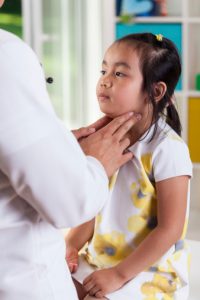With summer in full swing, we will be spending more time doing activities outdoors in areas such as parks, forests and hiking trails. While getting out and keeping physically fit is strongly encouraged it is important to keep in mind that being in these areas can put you at risk for Lyme disease.
Dr. Sherman Klein, MD, specializing in Internal Medicine at Flushing Hospital Medical Center’s Ambulatory Care Center offers the following information on Lyme disease, how it is spread, its symptoms, and treatment.
Lyme disease is the most common tick-born infection in New York City and in the United States. On the east coast, Lyme disease is spread by the bite of a black-legged tick infected with the bacterium Borrelia burgdorferi. Not all black-legged ticks carry this bacterium and, even if they are infected, they must be attached for at least 36 – 48 hours after a person is bitten to transmit the disease.
Blacklegged ticks are rarely found in NYC, but if you have been traveling in more rural areas of New York such as Westchester and Long Island you are at greater risk of coming into contact with an infected tick.
The annual number of cases of Lyme disease reported continues to rise each year in non-rural communities.
Some of the early warning signs of Lyme disease are:
- Muscle aches
- Headache
- Fatigue
- Fever
- Rash
These signs and symptoms may occur anywhere from three to 30 days after being bitten. After an infected tick bite, a widening red area may appear at the infected site that is clear in the center, forming a bull’s eye appearance.
Dr. Klein suggests that the best way to avoid contracting Lyme disease is to avoid direct contact with ticks. You can do this by avoiding wooded and brushy areas, and high grass. If you are hiking, try to walk in the center of the trails and wear long pants and a long-sleeved shirt. If in a wooded area you should use a strong repellent. Dr. Klein cautions that when using any repellent, you should avoid applying the solution to your hands, eyes and mouth.
Some of the tips to find and remove ticks from your body and clothing are:
- Do a check of your entire body viewing under your arms, behind and in your ears, inside your navel, behind your knees, along your legs, waist and hair. Also, check your pet.
- Take a shower soon after returning indoors. If you wash within two hours of returning indoors, the ticks are more easily found and washed off your body.
- Once you are indoors, take your clothing and place them in the wash using hot water and then put them in the dryer on “high” for at least 10 minutes; if the clothes were washed in cold water, place them in the dryer on “high” for at least 90 minutes
If Lyme disease is left untreated, it can spread to other parts of the body causing arthritis cardiac and nervous system problems. Dr. Sherman Klein is one of the many qualified doctors specializing in Internal Medicine at Flushing Hospital Medical Center. To schedule an appointment with him, or any of our other doctors, please call 718-670-5486
All content of this newsletter is intended for general information purposes only and is not intended or implied to be a substitute for professional medical advice, diagnosis or treatment. Please consult a medical professional before adopting any of the suggestions on this page. You must never disregard professional medical advice or delay seeking medical treatment based upon any content of this newsletter. PROMPTLY CONSULT YOUR PHYSICIAN OR CALL 911 IF YOU BELIEVE YOU HAVE A MEDICAL EMERGENCY.



